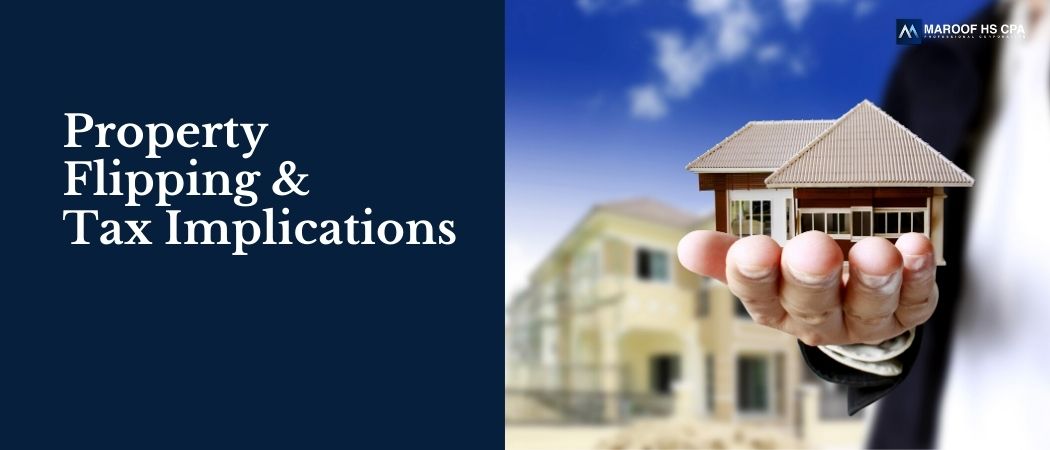Property flipping is an increasingly common practice to buy a property and then reselling it for a quick profit. Property flipping also includes assignment sales a.k.a. shadow flipping. Shadow flipping is the sale of a property before taking possession, mostly in cases of new construction with builders.
Property flipping is a key area of interest for the Canada Revenue Agency (CRA), especially for individuals with multiple real estate transactions or real estate agents.
A common misconception is that if you live in a property for one year, you can claim principal residence exemption. If the principal residence exemption is denied, the taxpayers can claim 50% income inclusion as Capital gain. Well, that’s not correct!
What is Property Flipping?
A property flip happens when a taxpayer buys a property with the intention to make a quick profit. The term quick means a short period of time.
The common examples of flipping properties are:
- Buying a property, renovating it and selling it.
- Buying a property with an objective of appreciation in its value to make a profit.
- Assignment sales are buying a property from the builder or developer when it’s not completely constructed and selling the same before taking possession.
Tax effects of Property Flipping in Canada
Property flipping is one of the quickest ways of making quick profits for many. Often individuals do keep on signing the contracts without asking specific contract details and questions from their real estate agents or lawyers. Property flipping affects both income taxes and excise taxes. If you have flipped more than one property, by the time CRA contacts you, the tax effects might be in the tens of thousands or even a couple of hundreds of thousands easily.
Business Income Vs. Capital Gains
When a property is purchased for long-term purposes and sold, the result is Capital gain (or loss). Half of the capital gains go to personal income, hence, only half is taxed. Business income, on the other hand, is included in full and taxed accordingly.
Due to higher tax savings because of half-income inclusion only, taxpayers tend to report their properties as Capital Gains.
The Income Tax Act (ITA) does not provide any test to determine whether the outcome of a real estate transaction is a business income or capital gain! However, case law provides certain tests to determine the outcome. Subsection 248(1) defines business as “…an adventure or concern in the nature of trade…”
Whether flipping property results in a business income or Capital gain depends on six key factors. These key factors are identified in an often-cited Happy Valley Farms Ltd. v. The Queen.
1. Nature of the property sold
If the property sold is not rented out or the flipper moves into the property for a short period of time, it’s more likely that it’s a flip. If the seller rents out the property or runs another business from it, it may change the nature of the resulting profits as business income. However, this is not the only factor.
2. Length of period of ownership
Another important fact to determine if the property is a flip is to see the length of the ownership of the property. Shorter the length of ownership, the more likely that it’s a business income.
3. Frequency of transactions
If the individual makes multiple transactions in a few years, it’s more likely that (s)he is in the business of flipping properties. This is common with real estate agents. When an individual reports multiple properties in income tax returns within a few years, this is when the CRA contacts and starts making reassessments.
4. Efforts and work performed on the property
If the property sold has undergone significant renovation shortly before its sales, it is seen as a business as well. When a buyer facelifts the property and, spends time and money to make it more attractive for future buyers, the sale by the same buyer has the appearance of an adventure or concern in the nature of trade.
5. The Motive
What were the intentions at the time of the purchase of the property? Did the taxpayer intend to move into the property to live there, or bought the property to generate a rental income? What was the duration of the financing; short-term or long-term?
6. Circumstances around the property sale
Why the property was sold? Are the circumstances surrounding the sale of the property matches with original intentions at the time of purchase? If the taxpayer sold the property due to sudden emergencies or other circumstances which interrupted his/her original intentions, it helps to be considered as a capital gain.
An example where the tax court classified profits from the sale as a business income is available here.
Claiming Principal Residence Exemption on Flips
Once a taxpayer determines that the resulting profits of a real estate property, particularly a residential one, is Capital Gain, many tend to claim it was a principal residence! Principal residence exemption shelters any capital gain resulting from the sale of a house acquired solely for the purpose of inhabiting.
Principle residence exemption does not apply to property flipping.
A tax court decision in November 2017 is available here where the court denied principal residence exemption. In the same case, the court also denied the income to be attributed as Capital Gain.
No New Housing Rebates on House Flipping
If you are in the business of flipping houses you are not entitled to the “new housing rebate”. One of the conditions for the new housing rebate is that it must be your primary place of residence. In flipping houses, you cannot claim the new housing rebate.
You can claim deductions against your business income
If property flipping is your business, you can claim income tax deductions which a business can. Amongst many other deductions, some specifically applicable to real estate transactions are:
- It’s a business so you can deduct expenses such as home office expenses, motor vehicles expenses, advertising and even meals and entertainment.
- Deduct all Legal costs, insurance, land transfer tax and other closing costs.
- In case if you have to terminate a mortgage, you can deduct that one.
- You can deduct all the closing costs such as the lawyer’s fee and realtor’s commissions
- While you are preparing to sell the property you can deduct all the expenses such as hydro, insurance, mortgage interest and other maintenance expenses.
- All the expenses incurred on renovations and improvements.
When you are in the property flipping business, the properties are held in your inventory.
You can be assessed for Gross Negligence Penalties
If you intentionally understate your income, CRA may impose Gross Negligence Penalties. The gross negligence penalty is 50% of the understated tax either due to an understatement of income or overstated credits.
Consider incorporating your property flipping business
It would be best if you considered incorporating your property-flipping business to take advantage of lower corporate taxes.
If you hold your property in a corporation for flipping it:
- Your property is an inventory item and its cost basis keeps on increasing with all renovations and expenses you make on it.
- The income you generate from slipping properties in a corporation is an “active business income”
- You cannot depreciate your property since its not a depreciable property
- The same criteria are applied to determine if the profits are business income or capital gains as mentioned above.
- If you earn rent from these properties, passive income rules are also applicable to rental income.
2023-Residential Property Flipping Rule Change
Updated: December 2022
Budget 2022 introduced a new rule to curb the rising residential properties due to speculations.
Dispositions (sales) of residential properties occurring after January 01, 2023, that do not meet the holding period requirement, are subject to full taxation! There is no principal residence exemption available for those dispositions. Gains realized from these dispositions do not get half-inclusion treatment of capital gains. The holding period is set for 12 months.
This rule is also applicable to profits from assignment sales, or disposition of rights to purchase residential properties.
There are certain exceptions of life events applicable though.
Please note that this does not, however, change the general application of capital gains vs business income previously discussed for the properties held more than 12 months or meeting exception criteria.
Disclaimer: This post is not tax advice of any sort. Due to the potential of high tax amounts, readers must consult their professional tax advisers or real estate lawyers for tax or legal advice. Maroof HS CPA Professional Corporation is a professional accounting firm in Toronto providing individual income tax services and corporate income tax services in Canada.






2 thoughts on “Flipping Houses – Business Income Vs Capital Gains”
Hi, i came across your website and posts while researching about house flipping within a corporation. I have done a few but want to make sure my corporate structure is correct and if needs any tweaking before the next purchase, which is in November. Want to make sure i can justify this being an active business and not a passive one. Looking for a consultation so i can move my personal and company taxes to an accounting firm
Thankyou you can get in touch with me using the contact us form.